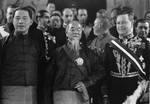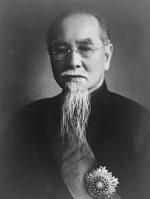Lin Sen
| Surname | Lin |
| Given Name | Sen |
| Born | 16 Mar 1868 |
| Died | 1 Aug 1943 |
| Country | China |
| Category | Government |
| Gender | Male |
Contributor: C. Peter Chen
ww2dbaseLin Sen, courtesy name Lin Zichao, was born into a middle class family in the village of Shangan, Minhou County, Fujian Province, Qing Dynasty China in 1868. In 1877, he enrolled in the Peiyuan School, a school established by American missionaries. In 1881, he passed the enrollment examination for the Heling Anglo-Chinese College in Fuzhou, Fujian Province. In 1884, a government employee, he was sent to Taipei, Taiwan Province to work in the Telegram Bureau. The Chinese defeat in the First Sino-Japanese War resulted in the loss of Taiwan to Japan, and Lin remained in Taiwan for seven years as a member of an anti-Japanese guerrilla force. In 1902, he returned to mainland China and gained employment with the customs office in Shanghai. Shortly after, he emigrated to the United States Territory of Hawaii and then to San Francisco, California, United States. In 1905, he joined the Tongmenghui, which was the Chinese revolutionary society, and the Nationalist Party. He was the head of the uprising in the city of Jiujiang in Jiangxi Province, China during the Xinhai Revolution that overthrew Qing Dynasty and established the Republic of China. After the formation of the republic, he became a member of the National Assembly. In Apr 1913, he was elected the Speaker of the National Assembly. In Nov 1913, during President Yuan Shikai's reign, he fled to the United States alongside of Sun Yatsen. In 1917, he followed Sun to Guangzhou, Guangdong Province, China as Sun established a new government; he became the Minister of Foreign Affairs. In 1921, he became the speaker of the Guangzhou government's legislature. Shortly after, he was named the Nationalist governor of Fujian Province, China. In Nov 1925, he was one of the founders of the Western Hills faction of the Nationalist Party, which was staunchly anti-communist. In 1927, Chiang Kaishek embarked on an anti-communist purge, and Lin, by now the leader of the Western Hills faction, rose in prominence. In 1931, Chiang ordered the arrest of political rival Hu Hanmin, a fellow Nationalist Party member, causing uproar, leading to Chiang's resignation as the Chairman of the Nationalist Government, a position equivalent to the later President of the Republic of China, in Dec 1931. Lin was appointed by the Nationalist Party as the successor. Out of deference, he turned down the privilege of residing in the Presidential Palace in Nanjing, China, allowing Chiang to remain there. As the scandal of 1931 faded, Chiang began to wield strong influence once again. Although Lin held the presidential title, the position gradually became ceremonial, while Chiang was regarded as the real head of government by the mid-1930s. Lin played a major role in the outlawing of concubinage. After WW2 broke out in China in 1937, he signed the law to legalize anti-Japanese guerrilla warfare. He passed away from a stroke while still in office in Aug 1943. Chiang, who was appointed by the party to succeed Lin, declared a month of mourning for Lin. He was buried in his estate Linyuan in Chongqing.
ww2dbaseSource: Wikipedia
Last Major Revision: Sep 2015
Lin Sen Interactive Map
Photographs
 |  |  |  |
Lin Sen Timeline
| 16 Mar 1868 | Lin Sen was born in Shangan, Minhou County, Fujian Province, Qing Dynasty China. |
| 2 Mar 1931 | Lin Sen was made the head of the Legislative Yuan of the Republic of China. |
| 15 Dec 1931 | Lin Sen was appointed by the Nationalist Party to become the President of the Republic of China after the resignation of Chiang Kaishek. |
| 28 Dec 1931 | Lin Sen stepped down as the head of the Legislative Yuan of the Republic of China. |
| 10 Mar 1943 | Lin Sen was involved in an automobile accident in Chongqing, China. |
| 12 Mar 1943 | Lin Sen suffered a stroke during a meeting with the Canadian delegation to Chongqing, China. |
| 1 Aug 1943 | Lin Sen passed away in Chongqing, China. |
Did you enjoy this article or find this article helpful? If so, please consider supporting us on Patreon. Even $1 per month will go a long way! Thank you. Share this article with your friends: Stay updated with WW2DB: |
- » Wreck of USS Edsall Found (14 Nov 2024)
- » Autumn 2024 Fundraiser (7 Nov 2024)
- » Nobel Peace Prize for the Atomic Bomb Survivors Organization (11 Oct 2024)
- » Wreck of USS Stewart/DD-224 Found (2 Oct 2024)
- » See all news
- » 1,150 biographies
- » 337 events
- » 43,917 timeline entries
- » 1,241 ships
- » 350 aircraft models
- » 207 vehicle models
- » 375 weapon models
- » 123 historical documents
- » 260 facilities
- » 470 book reviews
- » 28,546 photos
- » 432 maps
Chiang Kaishek, 31 Jul 1937
Please consider supporting us on Patreon. Even $1 a month will go a long way. Thank you!
Or, please support us by purchasing some WW2DB merchandise at TeeSpring, Thank you!